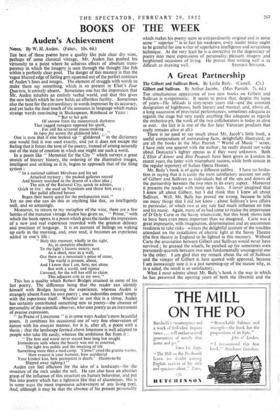BOOKS OF THE WEEK
Auden's Achievement
Nones. By W. H. Auden. (Faber. 10s. 6d.) THE best of these poems have a quality like pale clear dry wine, perhaps of some classical vintage. Mr. Auden has pushed his virtuosity to a point where he achieves effects of absolute trans- parency in which the imagery is seen through the thought like fish within a perfectly clear pool. The danger of this mastery is that the vague blurred edge of feeling gets squeezed out of the perfect contours of Auden's lines and images. The element of struggle with words to make them say something, which is so present in Eliot's Four Quartets, is entirely absent. Sometimes one has the impression that Mr. Auden inhabits an entirely verbal world, and that this gives the new beliefs which he now holds an effortless facility. Sometimes also the taste for the extraordinary in words impresses by its accuracy, and yet lacks the final touch of the sensuous in language which makes strange words convincing in Shakespeare, Rimbaud or Yeats :
"But to her gale Of sorrow from the moonstruck darkness That ragged runagate opposed his spark, For still his scrannel music-making In tipsy joy across the gliddered lake ... "
One is sure that if one looked up" gliddered " in the dictionary one would find it was used exactly, and yet it does not escape the feeling that it forces the tone of the poetry, instead of arising naturally out of the state of emotion in which one might use such a word.
In a poem like" Memorial for the City " which surveys a great stretch of literary history, the ordering of the illustrative images, intelligent and striking as it is, begins to approach that of the filing system : "In a national cabinet Mirabeau and his set
Attacked mystery ; the packed galleries roared And history marched to the drums of a clear idea ; The aim of the Rational City, quick to admire, Quick to tire : she used up Napoleon and threw him away ; Her pallid affected heroes Began their hectic quest for the prelapsarian man."
Yet no one else can do this or anything like this, so intelligently well, and so amusingly.
Moreover, to return to my metaphor of the wine, there are a few bottles of the maturest vintage Auden has given us. " Prime," with which the book opens, is a poem which gives the reader the impression of a new and real experience recorded with the greatest delicacy and precision of language. It is an account of feelings on waking up early in the morning, and, once read, it becomes an experience added to one's life :
"Holy this moment, wholly in the right, As, in complete Obedience To the light's laconic outcry, next As a sheet, near as a wall, Out there as a mountain's poise of stone, The world is present, about, And I know that I am, here, not alone But with a world, and rejoice ' Unvexed, for the will has still to claim This adjacent arm as my own."
This has a quality which Robert Bridges attained in some of his last poetry. The difference being that the reader can identify himself with Bridges having the experience, whereas Auden is strangely absent from his own poetry ; one indentifies oneself simply with the experience itself. Whether or not this is a virtue, Auden has certainly contributed something new to poetry—the absence of personality of the scientific observer, who uses poetry as an instrument of precise expression. In Praise of Limestone "is in some ways Auden's most beautiful poem. It combines his occasional use of very fine observation of nature with his essayist manner, for it is, after all, a poem with a thesis : that the landscape formed above limestone is well adapted to people who take life easily, whereas the ambitious flee from it : "The best and worst never stayed here long but sought Immoderate soils where the beauty was not so external,
The light less public and the meaning of life Something more than a mad camp. 'Come!' cried the granite wastes, 'How evasive is your humour, how accidental Your kindest kiss, how permanent is death.' (Saints-to-be Slipped away sighing.) "
Auden. can feel affection for the idea of a landscape—for the structure of the rock under the soil. He can also have an abstract grasp of the influence of this structure on human behaviour, and put this into poetry which has a lightness like that of aluminium. His is in some ways the most impressive achievement of any living poet. And, although it may be that the absence of his present personality which makes his poetry seem so extraordinarily original and in some sense" superior " is in fact his weakness, every reader today ought to be grateful for one writer of superlative intelligence and scrupulous technique. At the very least lie is a corrective to the degeneracy of poetry into mere expressions of personality, pleasant imagery and heightened occasions of living. He proves that writing well is as


































 Previous page
Previous page